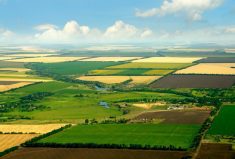For decades farmers have complained taxing farmland to help fund education is unfair, now two parties have promised to scrap education taxes on all property, including farmland and houses, in the dying days of the provincial election.
The Progressive Conservative (PC) Party of Manitoba announced Sept. 3, education taxes on property would be phased out over 10 years, or sooner, starting in 2022 when it plans to balance the provincial budget if re-elected.
The Green Party of Manitoba announced Sept. 4 it would end education taxes on property, but didn’t say how quickly.
Read Also

Students push for Manitoba road upgrades
Manitoba’s lack of higher-rated RTAC roads creates irritating highway detours and weight restrictions for farmers, University of Manitoba students told KAP.
The Greens say the more than $850 million a year in revenue raised through property taxes to help fund education would be replaced through “revenue-neutral” corporate and personal income taxes.
The PCs said they would replace the tax revenue through savings in government operations, resulting in a huge net tax saving to property owners.
Why it matters: Manitoba farmers would save tens of millions of dollars annually, while property owners collectively would save hundreds of millions if these promises are fulfilled. But are farmers, who are seeing the burden of education funding shift to them as farmland values appreciate faster than other property, prepared to wait?
Removing education taxes from farmland and production buildings has been a top priority for the Keystone Agricultural Producers (KAP) since it was founded as Manitoba’s general farm organization in 1984. But KAP has been pushing the issue harder the last few years in the wake of huge increases in education tax bills and evidence farmers are paying more than their fair share to fund education.
KAP president Bill Campbell, who farms at Minto, welcomed the PCs’ promise, but with provisos.
“We view it as very positive… ” Campbell said in an interview Sept. 4. “We are encouraged to see the PC party is committed to begin the process.
“However, KAP also believes that the next provincial government needs to take steps to ensure that rural and urban students continue to have equitable access to educational opportunities, and that this move doesn’t represent a long-term cut to the education system.”
NDP Leader Wab Kinew told reporters last week cutting education property taxes without replacing it with other tax revenue translates to education cuts.
KAP wants more details on the PCs’ promise.
“(I)t should not come at the expense… of market vulnerabilities that could be on the horizon,” Campbell said in a news release alluding to concerns trade issues are hurting farm income.
KAP is also concerned about the long phase- out time.
“(F)armers will continue to pay more than their fair share of education funding for up to 12 years,” KAP’s release says. “A 10-year shift in education funding also means that a future provincial government could rescind this decision given the arbitrary timeline and any number of financial pressures that could come into play.”
Once fully implemented, the average Manitoba homeowner will save $2,000 a year, Premier Brian Pallister said in a news release.
The Manitoba Real Estate Association praised the announcement, saying it will make home ownership more affordable and make funding schools more transparent and equitable.
The Manitoba School Boards Association (MSBA) also wants more information about the tax-cutting promise.
Its members currently determine how much property tax to collect locally to help fund schools in addition to money received from the Manitoba government.
“Our primary concern is that if through the local school board, consultation with local people determines that funding is required that isn’t otherwise coming from the province then we need to have the autonomy to do that (collect taxes to fund schools),” MSBA president Alan Campbell said in an interview Sept. 5. “Because without it outcomes will not improve. If anything they will go down.”
The MSBA agrees school boards should rely less on property taxes for revenue and understands the hit farmers are taking due to increases in farmland values, he added.
Campbell said Premier Pallister has made government more efficient, but wonders how enough savings will be found to offset all the revenue now collected from taxing property.
The PCs want to phase out education taxes so it can do so without replacing it with other taxes, Agriculture Minister Ralph Eichler said in an interview Sept. 4.
“We don’t have enough money to do it right off the bat, but certainly we are going to go about it in a way that is sustainable and not have to raise taxes… and still be able to find some relief, even though it’s not as much as we would like, but some relief and commitment to fixing this thing,” he said. “We’re the only province left in Canada (funding education through property taxes) so it’s high time.”
In the meantime, the education tax rebate on farmland will continue as the tax is cut by 10 per cent a year, Eichler said.
“We’ve already got $141 million budgeted for the first two years of the tax elimination,” he said.
“Ten per cent off $50,000 in tax on farmland is five grand. So they’ll save $5,000 right off the bat. The average is $2,000 taxes on a home. So that portion (saved) would be $200 the first year (for homeowners).”
Eichler also said Manitobans will be consulted about the plan “to make sure we get it right.” “We have thought this thing through and that’s why we’ve got a 10-year plan and did according to the way our finances are lining up.”
















